Archives
The Wine for the Wise
April 18, 2017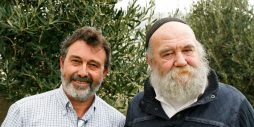
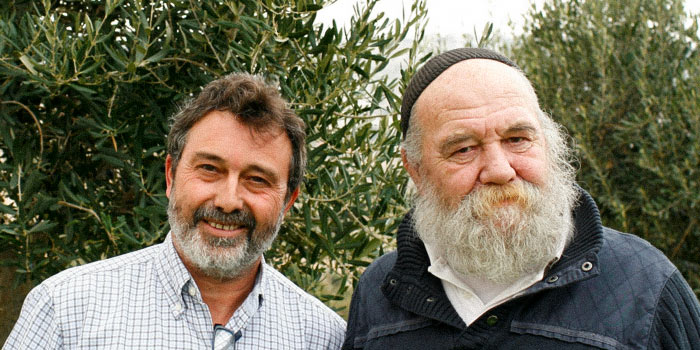
Have you ever wondered what inspires one to open a winery? For Avraham Moro and Michel Metzger, two French Jews who immigrated to Israel over than 30 years ago, the answer was quite fascinating. The two friends, who had been partners in construction business before, opened a winery when they wanted a business that would bring them not just money, but happiness. At the Amos Winery, you can feel it.
Upon entering Amos winery, you first arrive at the visitor’s center, a welcoming place where wine or coffee is served all day, music performances are held every Saturday evening, and art exhibitions take place from time to time.
When I ask the owners of the winery whether the visitors center brings any notable part of the profit, they start to laugh a bit nervously.”We do not lose too much on this,” Michel says with a sigh. “But we want to keep it anyway, because a winery is a business that you can only run with a joyous heart. Both me and Avraham like to have guests, like art and music, and we believe wine becomes better when there is music around.”
“I always tell the musicians who come here: Remember, there are barrels of wine behind you, please play the music that the wine will like,” Avraham adds.
He was the one who came up with the name for the winery – that of the prophet Amos, whose homeland was Biblical Tekoa and who said, “Behold days are coming, says the Lord, that the mountains shall drip sweet wine, and all the hills shall melt.”
When Avraham was a boy, he lived in Burgundy, France, where his grandfather would make wine for the family meals from grapes that grew surrounding their house. In 1980, following his several year long “pursuit of God”, as he puts it, Avraham came to Israel. Throughout his soul-searching, he converted to Judaism, took on the name of Avraham (which suits him –looking like a patriarch with his grey hair and big beard), and got married two years later. 30 out of his 37 grandchildren live in Judea & Samaria.
In the winery, he is mostly responsible for technical and engineering processes, while Michel deals more with the financial part of the business. They also have a professor of oenology (winemaking science) from the Beersheba University visit the winery regularly for advice. Amos Winery produces 15,000-20,000 bottles of wine per year from the grapes grown by Michel’s relative in Latrun near Jerusalem.
The owners are intended to increase this number to 40,000-50,000 bottles next year, mostly for the American market. Along with wine, they also make liqueurs – from raspberries grown in Tekoa, and from cherries grown in the Golan Heights.
Stationing a winery in Judea & Samaria does not help the business, because of the BDS movement that makes it harder to market and sell products made outside the Israeli ‘green line’. But Michel and Avraham say opening a winery in Tel Aviv or elsewhere in ‘proper’ Israel was not an option for them. “I do not like the word ‘territories’ at all,” Michel explains. “I think all of Israel is our land, including the settlements, so why make distinctions? Our history is here, in Judea and Samaria, and we rely on people who understand this, and who are smart enough to tell art – which wine is – from politics.” Speaking about the order of Cherry Liqueur from Lev Ha-Olam, Michel says, “It won’t make us rich, but it warms our hearts to know that there are people around the world who know about our existence here and care about us, to know that we are not alone.”
Help Lev HaOlam Design its Next T-Shirt and Win!
April 6, 2017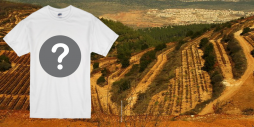
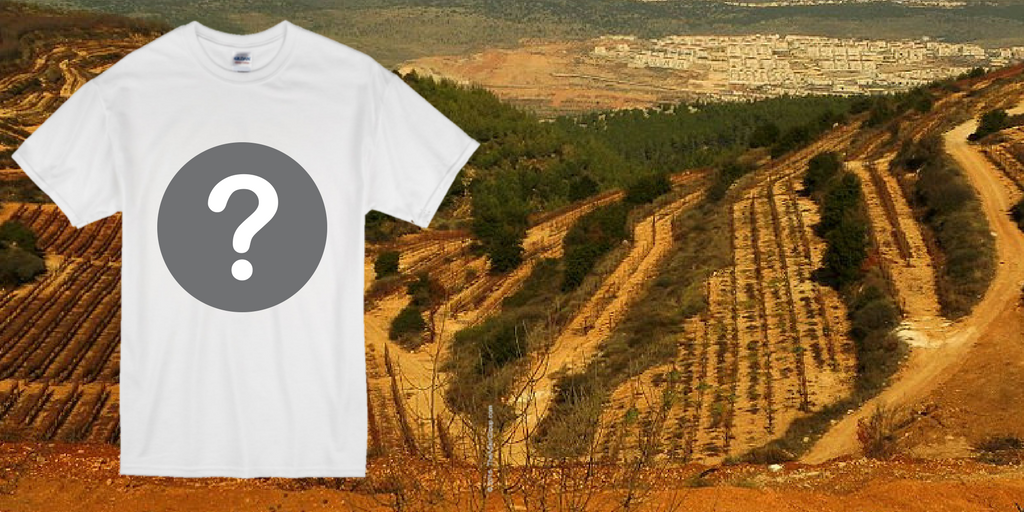
Lev HaOlam is looking to design a new t-shirt that relays Le HaOlam’s drive to connect the world with Israel’s Biblical Heartland. We want you to help us design it. Please leave your idea and contact information either in the comments section here, on Facebook, or in this site’s contact form.
The winner will receive a special package direct from Israel.
EXCLUSIVE: A Little Bit of Good: The Story of Jo Zander
April 3, 2017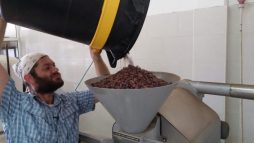
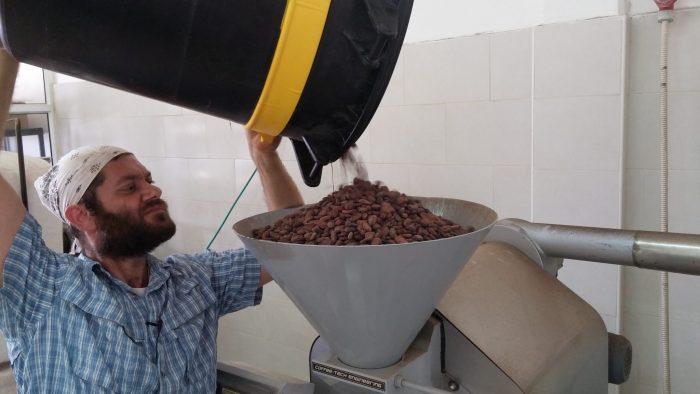
Founder of the “Holy Cacao” chocolate factory near Hebron Jo Zander is one of just a few dozen producers of bean-to-bar chocolate in the world. He sees his work as realization of a major commandment in Judaism: Improving the world.
What is your connection to chocolate, how did you come to founding a chocolate factory?
My connection to chocolate is both old and new. My grandfather was a baker, and I worked for him as a kid. I did not like chocolate at that time, I didn’t even like sweets at all, but there I learned to do things from scratch.
Then I went to college and studied engineering, which was not really exciting for me. I worked in the field a little, and after three years I was done, I could not do it any longer. So I left engineering and went to culinary school, and there I rediscovered chocolate. It was at a time when there were just five companies in America doing chocolate from the bean, and one of them was in Denver, Colorado, where I lived. I called them up and asked if I could come and see, and I was overtaken by the smell, by the beans… They made a very bitter chocolate, and there were flavors in it that I never really encountered in chocolate. It was something exciting I did not know even existed.
So you decided you would establish the sixth chocolate company?
Basically, yes. From this initial excitement grew this process of exploration of just everything possible – tree, growing, harvesting, processing.
There wasn’t a place you could go to learn.
The industry did not exist. There was an online conversation of enthusiasts, me included, about how you can make machines to make chocolate. It takes a lot of energy to transform the bean to chocolate. You have to reduce the size of the bean up to 100 times, and there is no one single machine that can do this, you need several. We (me and my partner) began to build my own machines. Our first roaster was a 10-year old dryer.
There was a lot of discovery and experimentation, and that’s how the company got off the ground, and thank G-d in several years we were able to buy machinery that was the next level up in terms of production capacity.We grow beans in South America, so we control the entire process, we know exactly what gets into the chocolate we produce. We also import beans from other places like Papa New Guinea, Madagascar, and Venezuela.
Why did you chose to settle in the Hebron area?
One of my friends once invited me to visit this place, when I was studying in a yeshiva in Gush Etzion. While I was driving, I was thinking – this is too far away, there are too many Arabs, it does not feel like I could ever live here… But once I got on top of the hill, the entire view opened up, I could see the Dead sea. It does not happen here every day, but that day it was crystal clear. And I thought I want to have that view for the rest of my life. At that time I could not know yet that I will get so much love and support from the community here, which is such a warm feeling. And the fact that we were 5 minutes away from Hebron, from Avraham Avinu (Abraham our Father), is so powerful.
Is it difficult to have company here?
Very difficult. Every time we have a shipment, it’s very difficult to convince someone to deliver to this area. But I love to bring people here.
Why at all did you chose to settle outside the ‘green line’, in Judea?
Honestly speaking, I don’t see the difference between this part of the line or that part of the line. I don’t differentiate in terms of safety, and I consider this land part of the land of Israel. This is the land of Avraham, the land of David. There is so much Jewish blood in this land, for thousands of years! I personally have a connection to Maarat HaMahpela (the Cave of the Patriarchs in Hebron), something inside my soul connects a lot to this place, more than to the Western wall. This is the land that requires physical labor, like producing olive oil from olives, which has been being done here for thousands of years. This is our job. My job is to do the world a little sweeter each day. This is what G-d gave to us. You can look at this place and see it dark, and bitter, and not so great, but we are always looking for a little bit of good, because a little bit of good is actually all we need.
Finding Roots and Magic: The Story of Nicole Yehezkel
February 2, 2017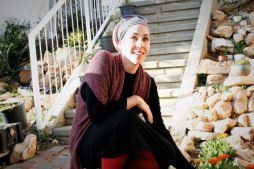
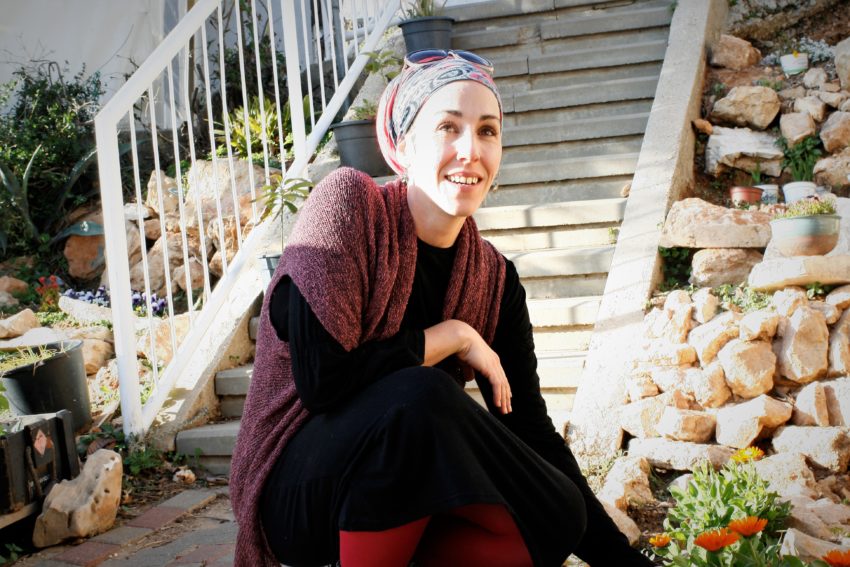
In just ten years, Nicole Yehezkel has changed her life in all ways possible. She moved from Florida to Israel, from school to the IDF, became religious, moved to a community in Judea and Samaria, and started her own business. She sells natural cosmetics and medicinal products from Israeli-grown materials – herbs, oils and flowers.
As we exit the car in the community of Halamish, or Neveh Tzuf, located in the hills of southwestern Samaria, just 26 km from Jerusalem, a stunning view with green hills all around opens up. I ask Nicole Yehezkel what she likes about living in Neveh Tzuf. She replies, “Same thing that you saw when you first arrived. The view. The air. You can breathe here. Wow, it’s just beautiful. Don’t you feel the magic?”
She first saw the place when she served in the army base nearby. “It would be nice to live here,” she remembers thinking. The road to settling in Neveh Tzuf, however, took several years, which started with her moving to Tzfat, getting married, opening a restaurant, closing it down, getting divorced and then meeting her current husband, who already lived in Neveh Tzuf.
Another stop on the way to Halamish was Nicole’s journey in becoming religious. “My sister was pregnant with twins, and there was a moment during her pregnancy when she was at risk. When I learned about this I took the Book of Psalms, which I had hardly ever read before this, and just started reading. It was an impulse which came from within. I had always been spiritual, and my parents – Israelis who left for the US – brought me up knowing what Shabbat and kashrut are, although they themselves are not religious. So Judaism came as something very natural,” Nicole reveals.
It took another pregnancy – this time, her own – to get her interested in holistic medicine and healthy living. Three years ago, she started studies in Shelem College in Jerusalem in ‘complimentary medicine in the spirit of Judaism’, where she still takes courses in naturopathy, Chinese medicine, acupuncture, aromatherapy, reflexology. Bringing theory to practice, half a year ago she opened her own naturopath practice, serving the community of Halamish, and started producing natural cosmetics and medicinal products under the brand “Shoresh” (‘root’ in English).
“Unlike traditional medicine which treats symptoms, I want to get to the root of the problem a person has with his health,” Nicole explains her choice of the brand name. “Also, I think we all need to get a bit back to the roots, to how things used to be. You did not need to go to the doctor or to the pharmacy for any small issue you had with your health – you knew which herb to use, or you could ask your mother… You did not buy all the food in the supermarket, you used to grow it yourself… I feel there is something very healing being in contact with soil, with nature. I grow some of the herbs I use, like calendula or thyme, myself, and I collect some others inside the settlement. You basically have everything you need around you, you just need to stop and look around! But that is exactly what a modern man is not able to do.”
As we talk, Nicole adds a sizable piece of beeswax into a large saucepan with olive oil, which had been previously heated for several hours together with calendula petals. She stirs it until it is melted, then adds several drops of lavender oil. Calendula salve – a perfect treatment for skin problems, including rashes, scrapes, and dry skin – is ready. All the components Nicole used were Israeli home-grown products.
She has been packing about 20 different-sized orders per week so far, all for Israeli customers. Everything, including labeling and packaging, is done inside Nicole’s house, with the help of her husband. The one who used to add five spoons of sugar to a cup of tea has gradually become a warm proponent of healthy living, Nicole laughs.
On the wall there is a picture of her husband with a herd of goats. He used to have a dozen goats which he herded himself, until they were stolen several years ago. During the November fires in Israel, their house escaped fire narrowly, with the family needing to be evacuated in the middle of Shabbat. For several days Halamish residents were constantly on alert, trying to catch the fires around the settlement early and to prevent damage to the houses. “Life here is not easy,” Nicole admits, “but I would not trade it for living in the city.” She believes she has found the right thing to do in her life, and the right place to do it.
